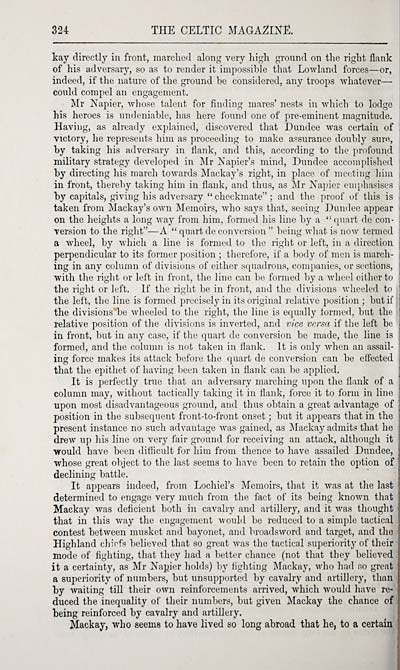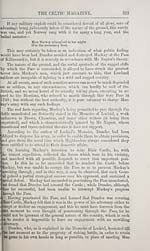Blair Collection > Celtic magazine > Volume 2
(334)
Download files
Complete book:
Individual page:
Thumbnail gallery: Grid view | List view

324 THE CELTIC MAGA^mE.
kay directly in front, marched along very high ground on the right flank
of his adversary, so as to render it impossible that Lowland forces — or,
indeed, if the nature of the ground be considered, any troojjs -whatever —
could compel an engagement.
Mr Napier, "whose talent for finding mares' nests in Avhich to lodge
his heroes is undeniable, has here found one of pre-eminent magnitude.
Having, as already explained, discovered that Dundee was certain of
victory, he represents him as proceeding to make assurance doubly sure,
by taking his adversary in flank, and this, according to the profound
military strategy developed in Mr Napier's mind, Dundee accomplished
by directing his march towards Mackay's right, in place of me(;ting him
in front, thereby taking him in flank, and thus, as Mr Napier em[)hasises
by capitals, giving his adversary " checkmate" ; and the proof of this is
taken from Mackay's own Memoirs, who says that, seeing Dundee appear
on the heights a long Avay from him, formed his line by a "quart de con-
version to the right" — A " quart de conversion " being what is now termed
a wheel, by which a line is formed to the right or left, in a direction
perpendicular to its former position ; therefore, if a body of men is march-
ing in any column of divisions of either squadrons, companies, or sections,
with the riglit or left in front, the line can be formed by a wdieel either to
the right or left. If tlie right be in front, and the divisions wheeled to
the left, the line is formed precisely in its original relative position ; but if
the divisions be wheeled to the right, the line is equally formed, but the
relative position of the divisions is inverted, and vice versa if the left be
in front, but in any case, if the quart de conversion be made, the line is
formed, and the column is not taken in flank. It is only when an assail-
ing force makes its attack before the quart de conversion can be eff"ected
that the epithet of having been taken in flank can be applied.
It is perfectly true that an adversary marching upon the flank of a
column may, without tactically taking it in flank, force it to form in line
upon most disadvantageous ground, and thus obtain a great advantage of
position in the subsequent front-to-front onset ; but it appears that in the
present instance no such advantage was gained, as INIackay admits that he
drcAv up his line on A'ery fair ground for receiving an attack, although it
"would have been diflicult for him from thence to have assailed Dundee,
■whose great object to the last seems to have been to retain the option of
declining battle.
It appears indeed, from Lochiel's Memoirs, that it Avas at the last
determined to engage very much from the fact of its being known that
Mackay was deficient both in cavalry and artillery, and it was thought
that in this way the engagement would be reduced to a simple tactical
contest between musket and bayonet, and broadsword and target, and the
Highland chiefs believed that so great was the tactical superiority of their
mode of fighting, that they had a better chance (not that they believed
it a certainty, as Mr Napier holds) by fighting JNIackuy, who had so great
a superiority of numbers, but unsupported by cavalry and artillery, than
by Avaiting till their own reinforcements arrived, which would have re-
duced the inequality of their numbers, but given IMackay the chance of
being reinforced by cavalry and artillery.
Mackay, who seems to have lived so long abroad that he, to a certain
kay directly in front, marched along very high ground on the right flank
of his adversary, so as to render it impossible that Lowland forces — or,
indeed, if the nature of the ground be considered, any troojjs -whatever —
could compel an engagement.
Mr Napier, "whose talent for finding mares' nests in Avhich to lodge
his heroes is undeniable, has here found one of pre-eminent magnitude.
Having, as already explained, discovered that Dundee was certain of
victory, he represents him as proceeding to make assurance doubly sure,
by taking his adversary in flank, and this, according to the profound
military strategy developed in Mr Napier's mind, Dundee accomplished
by directing his march towards Mackay's right, in place of me(;ting him
in front, thereby taking him in flank, and thus, as Mr Napier em[)hasises
by capitals, giving his adversary " checkmate" ; and the proof of this is
taken from Mackay's own Memoirs, who says that, seeing Dundee appear
on the heights a long Avay from him, formed his line by a "quart de con-
version to the right" — A " quart de conversion " being what is now termed
a wheel, by which a line is formed to the right or left, in a direction
perpendicular to its former position ; therefore, if a body of men is march-
ing in any column of divisions of either squadrons, companies, or sections,
with the riglit or left in front, the line can be formed by a wdieel either to
the right or left. If tlie right be in front, and the divisions wheeled to
the left, the line is formed precisely in its original relative position ; but if
the divisions be wheeled to the right, the line is equally formed, but the
relative position of the divisions is inverted, and vice versa if the left be
in front, but in any case, if the quart de conversion be made, the line is
formed, and the column is not taken in flank. It is only when an assail-
ing force makes its attack before the quart de conversion can be eff"ected
that the epithet of having been taken in flank can be applied.
It is perfectly true that an adversary marching upon the flank of a
column may, without tactically taking it in flank, force it to form in line
upon most disadvantageous ground, and thus obtain a great advantage of
position in the subsequent front-to-front onset ; but it appears that in the
present instance no such advantage was gained, as INIackay admits that he
drcAv up his line on A'ery fair ground for receiving an attack, although it
"would have been diflicult for him from thence to have assailed Dundee,
■whose great object to the last seems to have been to retain the option of
declining battle.
It appears indeed, from Lochiel's Memoirs, that it Avas at the last
determined to engage very much from the fact of its being known that
Mackay was deficient both in cavalry and artillery, and it was thought
that in this way the engagement would be reduced to a simple tactical
contest between musket and bayonet, and broadsword and target, and the
Highland chiefs believed that so great was the tactical superiority of their
mode of fighting, that they had a better chance (not that they believed
it a certainty, as Mr Napier holds) by fighting JNIackuy, who had so great
a superiority of numbers, but unsupported by cavalry and artillery, than
by Avaiting till their own reinforcements arrived, which would have re-
duced the inequality of their numbers, but given IMackay the chance of
being reinforced by cavalry and artillery.
Mackay, who seems to have lived so long abroad that he, to a certain
Set display mode to: Large image | Transcription
Images and transcriptions on this page, including medium image downloads, may be used under the Creative Commons Attribution 4.0 International Licence unless otherwise stated. ![]()
| Early Gaelic Book Collections > Blair Collection > Celtic magazine > Volume 2 > (334) |
|---|
| Permanent URL | https://digital.nls.uk/78484162 |
|---|
| Description | Volume II, 1877. |
|---|---|
| Shelfmark | Blair.3 |
| Attribution and copyright: |
|
| Description | A selection of books from a collection of more than 500 titles, mostly on religious and literary topics. Also includes some material dealing with other Celtic languages and societies. Collection created towards the end of the 19th century by Lady Evelyn Stewart Murray. |
|---|
| Description | Selected items from five 'Special and Named Printed Collections'. Includes books in Gaelic and other Celtic languages, works about the Gaels, their languages, literature, culture and history. |
|---|

